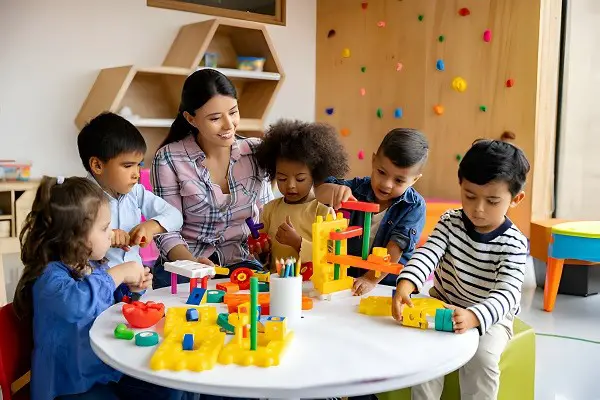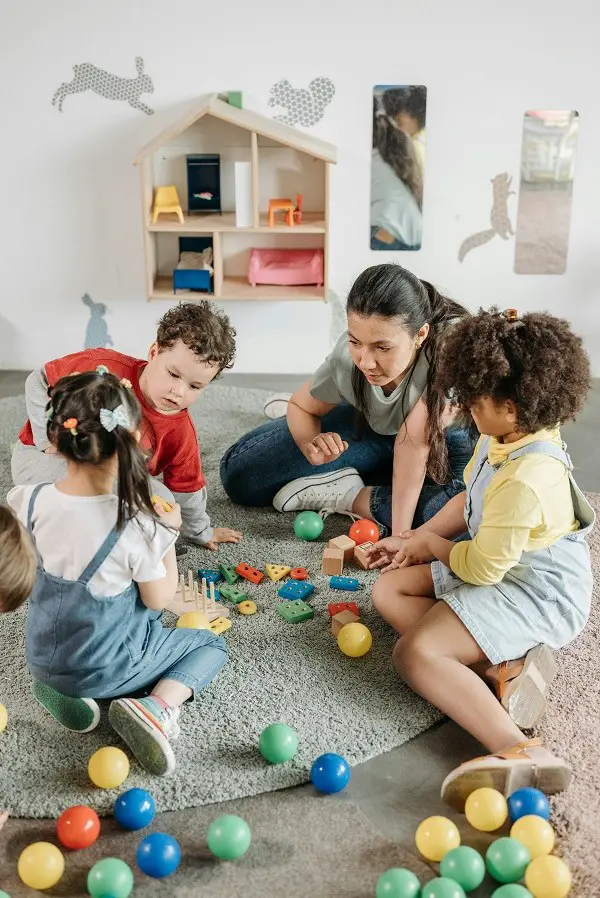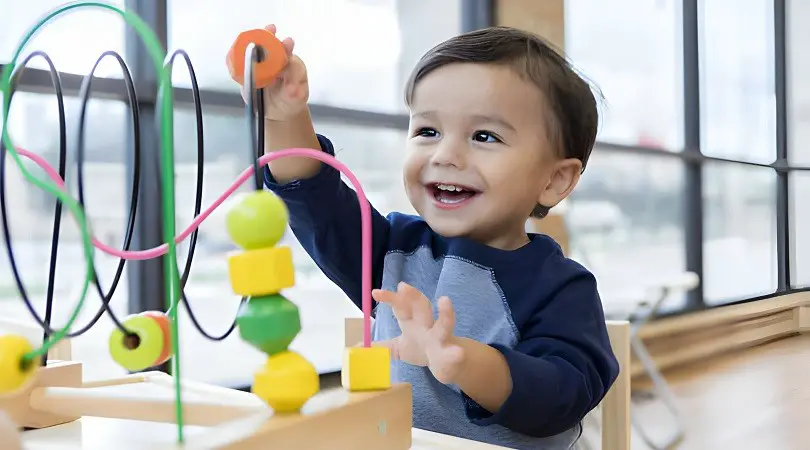Last Updated on January 6, 2025
Educational toys foster learning through play. They engage children and promote skill development effectively.
Children thrive through engaging, hands-on learning experiences. Educational toys play a crucial role in promoting cognitive, social, and emotional development. By integrating learning with play, children can explore various concepts in a fun and interactive way. Through the power of play, educational toys encourage creativity, problem-solving skills, and critical thinking.
Additionally, these toys help improve fine motor skills and enhance hand-eye coordination. Ultimately, educational toys provide a well-rounded learning experience that supports children’s growth and development. Investing in high-quality educational toys can have a lasting impact on a child’s learning journey.
Benefits Of Play-based Learning

Play-based learning offers numerous advantages for children, enhancing their cognitive development and social skills while making the educational experience enjoyable. Let’s delve into the specific benefits it provides.
Enhanced Cognitive Development
- Stimulates creativity and problem-solving abilities.
- Improves critical thinking and decision-making skills.
- Enhances memory retention and promotes learning.
Improved Social Skills
- Encourages cooperation and teamwork.
- Fosters communication and language development.
- Teaches empathy and emotional intelligence.
Types Of Educational Toys
Educational toys come in various forms, catering to different learning styles and developmental needs of children. From fostering creativity to honing cognitive skills, these toys play a pivotal role in children’s growth and learning. Let’s explore a few categories of educational toys that are designed to promote learning and skill development.
Stem Toys
STEM (Science, Technology, Engineering, and Mathematics) toys are designed to introduce kids to the principles of these disciplines in a fun and interactive way. These toys often involve building, experimentation, and problem-solving, encouraging children to think critically and develop a strong foundation in these essential subjects.
Puzzle And Logic Games
Puzzle and logic games are excellent for enhancing children’s problem-solving abilities and cognitive skills. These toys typically involve spatial reasoning, pattern recognition, and strategic thinking, providing a stimulating challenge for young minds. They offer an enjoyable way for children to exercise their brains and develop important analytical and reasoning skills.
Choosing The Right Educational Toy
Discover the key to fostering learning through play with educational toys that ignite imagination and curiosity. By selecting the right toy, children can enhance their cognitive abilities and develop essential skills while having fun. Choose toys that align with your child’s interests and promote hands-on learning experiences.
Age-appropriate Selection
When it comes to choosing the right educational toy for your child, it is essential to consider their age and developmental stage. Age-appropriate toys are designed to cater to specific learning needs and abilities, enabling children to engage meaningfully with the toy and learn effectively.
For infants and toddlers (0-3 years), choose toys that focus on sensory exploration and motor skills development. These could include soft toys, rattles, and shape sorters, which encourage sensory stimulation and hand-eye coordination.
For preschoolers (3-5 years), consider educational toys that promote cognitive development, creativity, and problem-solving. Building blocks, puzzles, and pretend play sets are great options that encourage imagination, logical thinking, and fine motor skills.
For school-aged children (6-10 years), look for toys that support their expanding knowledge and critical thinking skills. Science kits, building sets, and board games can encourage curiosity, independence, and collaboration.
Interests And Learning Styles
Another crucial factor to consider when selecting an educational toy is your child’s interests and learning style. By taking these into account, you can ensure that the toy will capture their attention and keep them engaged in learning.
Does your child have a passion for art or music?
A toy that incorporates these interests could be an ideal choice. Art supplies, musical instruments, or interactive books focused on these subjects can enhance your child’s creativity and self-expression.
Is your child a kinesthetic learner who thrives on hands-on experiences?
Look for toys that allow them to build, manipulate, and experiment. Building blocks, science kits, and construction toys can provide valuable opportunities for exploration and discovery.
Does your child prefer solitary play or enjoy group activities?
Consider their social preferences when choosing a toy. Board games, group puzzles, and team-building games can foster communication, cooperation, and problem-solving skills in a fun and interactive way.
When it comes to choosing the right educational toy, considering both age-appropriateness and your child’s interests and learning style is crucial. By making a thoughtful selection, you can provide your child with a toy that not only promotes learning but also sparks their curiosity, creativity, and joy of play.
Impact Of Educational Toys On Child Development
Discover how educational toys spark child development, fostering learning through play. These toys engage young minds, encouraging creativity and problem-solving skills essential for holistic growth. Unleash the power of playtime with educational toys that make learning fun and impactful.
Enhanced Problem-solving Skills
Through the use of educational toys, children can develop enhanced problem-solving skills at an early age. These toys often present challenges that require the child to think critically and develop appropriate strategies to overcome them. By engaging in play that encourages problem-solving, children can develop their cognitive abilities, logical thinking, and analytical skills.
Such toys can come in various forms, including puzzles, building blocks, and interactive games that prompt children to find solutions to specific problems. The process of actively seeking solutions to these challenges promotes a sense of curiosity, exploration, and imagination in young minds. This leads to the development of important problem-solving skills that are highly beneficial in later stages of education and life.
Encouragement Of Creativity
Educational toys also play a crucial role in fostering creativity and imagination among children. By providing them with the opportunity to engage in open-ended play, these toys allow children to explore their artistic abilities, enhance their self-expression, and develop their unique ideas.
Whether it be through arts and crafts sets, musical instruments, or imaginative playsets, these toys encourage children to think outside the box and come up with innovative solutions. This creative exploration not only enhances their imaginative abilities but also helps them in developing their communication skills and emotional intelligence.
Additionally, educational toys that encourage creativity often allow children to experiment with different materials, colors, and textures, fostering sensory development and fine motor skills. This multi-dimensional approach ensures the holistic growth of children, nurturing both their cognitive and physical abilities.
Incorporating Educational Toys In Daily Routine

Educational toys are a valuable resource for supporting a child’s learning and development. Incorporating educational toys into a child’s daily routine can enhance their cognitive, social, and emotional skills while making learning an enjoyable experience. By seamlessly integrating these toys into daily activities, parents can strike a balance between play and study time, and create numerous learning opportunities for their children.
Balancing Play And Study Time
Finding a balance between play and study time is essential for achieving a holistic approach to a child’s education. Educational toys provide an excellent way to introduce learning in a fun and engaging manner, ensuring that children have ample time for both structured learning as well as creative play. By incorporating educational toys into their daily routine, parents can effectively manage their child’s schedule, ensuring that there is ample time for both academic pursuits and imaginative play.
Creating Learning Opportunities
Educational toys open up a world of learning opportunities throughout a child’s daily activities. Whether it’s through playing with building blocks, solving puzzles, or engaging in interactive educational games, these toys provide a platform for children to explore, experiment, and learn. Parents can seize these opportunities to introduce new concepts, reinforce academic knowledge, and stimulate critical thinking skills, all while their child is immersed in play. By integrating educational toys into daily routines, parents can foster an environment where learning becomes a seamless and enjoyable part of their child’s day.
Frequently Asked Questions
What Are Educational Toys And Their Benefits?
Educational toys are specially designed to promote learning, critical thinking, and problem-solving skills in children. These toys provide a fun and engaging way for kids to enhance their cognitive development while playing.
How Do Educational Toys Enhance Learning?
Educational toys encourage hands-on exploration, foster creativity, and stimulate imagination, which are essential for the development of essential skills like problem-solving, concentration, and spatial awareness in children.
What Age Group Can Benefit From Educational Toys?
Educational toys are designed for various age groups, starting from infants and continuing through childhood. These toys are tailored to suit the developmental needs and learning milestones of different age ranges.
What Types Of Educational Toys Are Available?
There is a wide range of educational toys available, including building blocks, puzzles, interactive games, STEM kits, and learning resources that cater to different areas of development such as fine motor skills, logic, and creativity.
How Can Parents Choose The Best Educational Toys?
Parents should consider the child’s interests, developmental stage, and specific learning goals when selecting educational toys. Look for toys that align with the child’s abilities and offer opportunities for exploration and growth.
Conclusion
To sum up, educational toys play a vital role in promoting learning and cognitive development in children. By incorporating play into their everyday lives, children can enhance their problem-solving abilities, creativity, and social skills. From building blocks to puzzles and interactive games, these toys provide an engaging and fun way for children to acquire knowledge and explore new concepts.
Investing in educational toys not only fosters children’s love for learning but also lays a strong foundation for their future success. So, let’s empower our children with the power of play and watch them thrive academically and personally.








